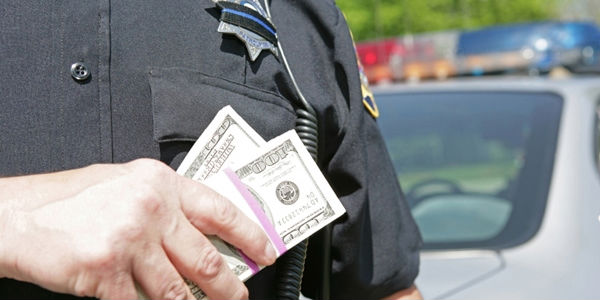Suppose you decide to buy a used car from a guy on Craigslist. You’ve found the car you want, and you’re going to buy it outright. It’s only $4,000, and you decide to pay cash because it will be more convenient for both of you. So, on the day of the sale, you get the money and go to purchase the car.
Videos by Rare
On the way there, you roll through a stop sign. Bad luck—a cop saw you. He pulls you over, and while he’s writing up a ticket, catches a glimpse of your bank envelope in the passenger seat. Suddenly, he asks to search your car. You don’t have anything to hide, so what’s the harm, right?
The next thing you know, the officer is thumbing through your twenties. He grills you on why you’re carrying this much cash. It’s suspicious, he says. A check would have been easier if you’re really just buying a car.
“I’m going to have to confiscate this,” he finally concludes. You immediately protest: “On what charge? Am I being arrested? Can I call my lawyer?”
Nope. You’re not being arrested, and you can’t call your lawyer. In fact, you’re not being charged with any criminal activity.
This is called civil asset forfeiture—and you’re never going to see a dime of that money again.
“Civil asset forfeiture” sounds like some obscure legal thing. It’s not. In fact, it’s probably the biggest threat to private property you’ve never even heard of.
Here’s how it works: Civil asset forfeiture is basically a law which allows a police officer who finds you “suspicious” to just take your stuff.
Once your property has been confiscated, the burden of proof is on you, not the police, to show that you didn’t get it from any criminal activity. Even if you personally are cleared of all charges, that may not matter. As the Philadelphia City Paper reports, “Technically, it’s the property—not its owner—that’s being accused of criminality, which means the property can be subject to forfeiture whether or not its owner is ever convicted of a crime.”
In other words, they don’t have to charge you. They don’t have to present any evidence of illegal activity. In fact, you have no right to a lawyer and won’t get a day in court. In some jurisdictions, you actually have to pay thousands of dollars just to be able to contest the seizure.
And guess what? The police conveniently happen to consider large amounts of cash very suspicious indeed—but not too suspicious to dump it right into their own department coffers.
And we’re talking big money. “Between 2004 and 2009, Philadelphia collected some $36 million via civil forfeiture,” mainly from young, black men. Long Island police took in $31 million in a single year. The State of Virginia seized assets and cash worth more than $18 million in 2013 alone. In the same year, Michigan’s civil asset forfeiture profits topped $16 million, and the State of Texas took a whopping $106 million from its citizens.
For many, the forfeitures’ effects can be devastating. If our car buying hypothetical is difficult to believe, let me assure you that it’s not a creation of my imagination. It’s pretty much exactly what happened to Jennifer Boatright, a waitress from Texas who was buying a used car using cash she’d presumably saved up from tips.
Even though no evidence of drugs were found in her car, Boatright was told by police that she’d have to forfeit the cash she was carrying unless she wanted to be charged with money laundering and—even worse—see her two young children taken away and put in foster care. As any good mother would when faced with this kind of unthinkable extortion, she signed away her savings to keep her kids.
Stories like Boatright’s are sad and numerous:
- A Minnesota couple lost $48,000 to Iowa police, who confiscated money they had collected to make a cash purchase of land from a family member.
- A California man who immigrated to the US from Iran in search of freedom lost an entire office building he owned because one of his tenants operated a medical marijuana facility which got busted by the Feds…even though it was 100% legal in his state.
- A woman driving through Georgia had the $11,000 she was carrying to make a deposit on her new home seized even though she was accused of no criminal activity.
- Two men in Virginia only barely succeeded in contesting the forfeiture of $28,000 they had to buy—get this—land and a trailer for their church
When this “policing for profit” is legal, it gives police all the wrong incentives during their interactions with citizens.
And let’s be honest: “civil asset forfeiture” is too kind a term. This is theft.



